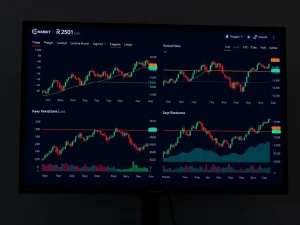Bold Move: Bitcoin & Crypto Firms Migrate to El Salvador – But Will Banking Unlock Success?

El Salvador’s audacious embrace of Bitcoin has turned heads globally, positioning itself as a beacon for crypto innovation in Latin America. But as Bitcoin enthusiasts and crypto companies set up shop, a critical question looms large: can El Salvador secure the necessary banking access to truly become the crypto Silicon Valley of LATAM? This is the million-dollar question that will determine whether President Bukele’s ambitious vision becomes a reality or remains a pipe dream. Let’s delve into the exciting, yet complex, world of crypto in El Salvador and explore what’s at stake.
Why El Salvador is Betting Big on Bitcoin Adoption?
In September 2021, El Salvador made history by becoming the first nation to adopt Bitcoin as legal tender. This move wasn’t just a symbolic gesture; it was a calculated strategy to revitalize the nation’s economy and attract foreign investment. But why Bitcoin, and why now?
- Financial Inclusion: A significant portion of El Salvador’s population is unbanked. Bitcoin offers a potential solution, providing access to digital financial services without needing a traditional bank account.
- Remittance Revolution: Remittances are a crucial lifeline for El Salvador’s economy. Bitcoin transactions promise lower fees and faster transfer times compared to traditional remittance services, putting more money in the pockets of Salvadoran families.
- Attracting Innovation and Investment: By embracing Bitcoin, El Salvador aims to create a crypto-friendly environment, attracting blockchain companies, investors, and digital nomads, thus boosting the local economy and creating jobs.
- Economic Independence: Some view Bitcoin adoption as a step towards reducing reliance on traditional financial systems and potentially mitigating the impact of global economic fluctuations.
The Allure for Crypto Firms in El Salvador
El Salvador’s pro-crypto stance has undoubtedly attracted the attention of crypto firms worldwide. The promise of operating in a nation where Bitcoin is legal tender, coupled with a potentially lighter regulatory touch compared to other jurisdictions, is a powerful draw. But what exactly makes El Salvador appealing to these businesses?
- Legal Tender Status: Operating in a country where Bitcoin is legal tender simplifies transactions and accounting for crypto-based businesses. It reduces regulatory uncertainty and fosters a more welcoming environment.
- Tax Incentives: While specific details may vary, El Salvador has signaled its intention to offer tax incentives to attract crypto businesses, further sweetening the deal for companies considering relocation or expansion.
- Pioneering Spirit: For many in the crypto space, El Salvador represents a bold experiment in financial innovation. Being part of this pioneering effort is inherently appealing to companies that thrive on disruption and pushing boundaries.
- Lower Operating Costs: Compared to established tech hubs, El Salvador may offer lower operating costs, including office space and labor, making it an attractive location for startups and growing companies.
The Banking Bottleneck: Why Crypto Banking Access is Crucial?
Despite the excitement and potential, El Salvador’s crypto ambitions face a significant hurdle: banking access. Traditional banks, particularly those with ties to the US financial system, have been hesitant to fully embrace crypto businesses due to regulatory uncertainties and compliance concerns. This reluctance creates a bottleneck that could stifle El Salvador’s crypto hub aspirations.
Challenges in Crypto Banking Access
- Regulatory Scrutiny: US banks, and many international banks, operate under strict regulatory frameworks. Engaging with crypto businesses, especially in a jurisdiction like El Salvador with novel crypto laws, raises compliance red flags and potential risks.
- Anti-Money Laundering (AML) Concerns: Crypto’s association with illicit activities, though often overstated, fuels concerns about money laundering and illicit financing. Banks are wary of the enhanced due diligence and compliance costs associated with crypto clients.
- De-risking Strategies: Many banks have adopted de-risking strategies, opting to terminate or restrict relationships with entire categories of clients perceived as high-risk, including crypto businesses, to avoid potential regulatory penalties.
- Correspondent Banking Relationships: El Salvadorian banks rely on correspondent banking relationships with larger international banks, often in the US, to facilitate international transactions. If these correspondent banks are wary of crypto, it limits the ability of Salvadorian banks to serve crypto businesses effectively.
Pathways to Bridging the Banking Gap for Crypto Firms
Overcoming the banking bottleneck is paramount for El Salvador to realize its vision of becoming a crypto hub. Several strategies can be explored to bridge this gap and foster better relations between traditional finance and the burgeoning crypto sector.
Potential Solutions for Enhanced Crypto Banking Access
- Clear Regulatory Frameworks: El Salvador can work towards establishing clearer and more comprehensive regulatory frameworks for crypto assets and businesses. This can provide greater clarity and comfort to banks, reducing perceived risks.
- Proactive Engagement with US Banks: El Salvadorian authorities and crypto businesses can proactively engage with US banks and regulators to address concerns, build trust, and demonstrate robust compliance measures.
- Specialized Crypto Banks: The emergence of specialized crypto-friendly banks, either within El Salvador or internationally, could provide dedicated banking services to crypto firms, circumventing the reluctance of traditional institutions.
- Technological Solutions for Compliance: Leveraging blockchain analytics and compliance technologies can enhance transparency and traceability of crypto transactions, helping to mitigate AML concerns and build confidence among banks.
- International Collaboration: Working with international organizations and other crypto-friendly jurisdictions can help establish best practices and standards for crypto regulation and banking, fostering greater acceptance and interoperability.
Will El Salvador Become LATAM’s Crypto Silicon Valley?
El Salvador’s journey into the world of Bitcoin and crypto is undoubtedly ambitious and fraught with challenges. The nation’s success in becoming LATAM’s crypto Silicon Valley hinges significantly on its ability to navigate the complexities of banking access. While the allure of Bitcoin adoption and a crypto-friendly environment is undeniable, practical realities, particularly the need for seamless integration with the traditional financial system, cannot be ignored.
If El Salvador can successfully address the banking bottleneck, foster trust with international financial institutions, and continue to innovate in the crypto space, its vision of becoming a regional crypto hub is within reach. However, failure to secure adequate banking access could severely limit the potential of its crypto experiment and hinder its economic aspirations. The world is watching closely as El Salvador charts this uncharted territory, and the lessons learned will undoubtedly shape the future of crypto adoption globally.
Conclusion: The Future of Crypto in El Salvador – A Balancing Act
El Salvador’s bold embrace of Bitcoin and its aspiration to become a crypto haven presents both immense opportunities and significant challenges. The success of this endeavor will depend on a delicate balancing act: fostering innovation and attracting crypto businesses while simultaneously addressing the legitimate concerns of the traditional financial world, particularly regarding banking access. The path forward requires collaboration, clear communication, and a commitment to building bridges between the old and the new financial paradigms. Only time will tell if El Salvador can unlock the full potential of its crypto bet and truly become the crypto Silicon Valley of Latin America. The journey is just beginning, and the world is eager to see what unfolds.










